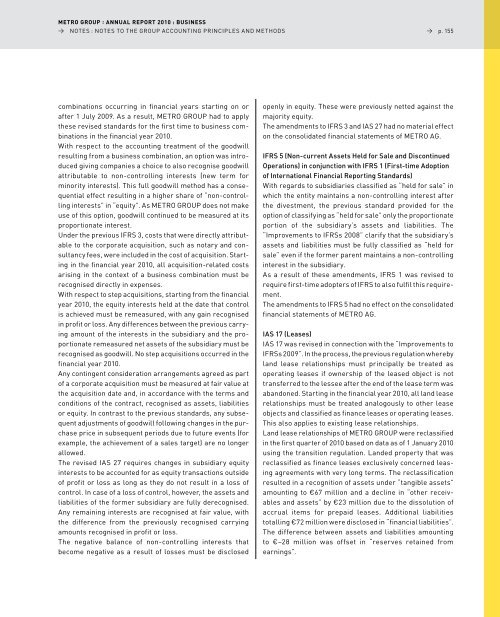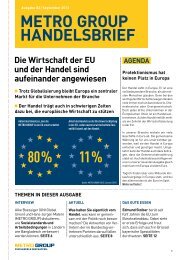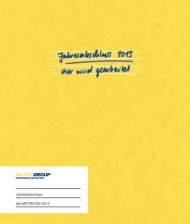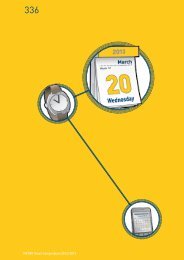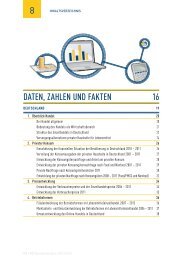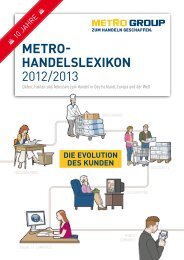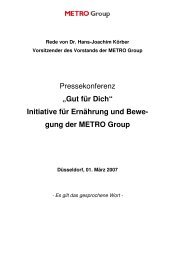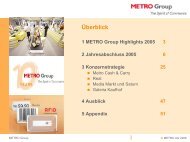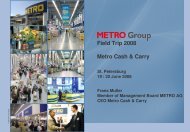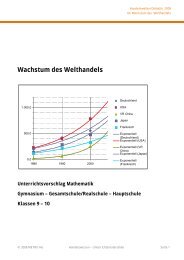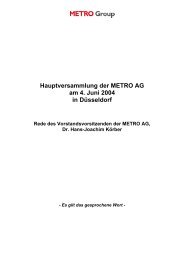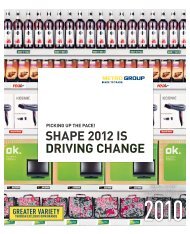pdf (2.5 MB) - METRO Group
pdf (2.5 MB) - METRO Group
pdf (2.5 MB) - METRO Group
You also want an ePaper? Increase the reach of your titles
YUMPU automatically turns print PDFs into web optimized ePapers that Google loves.
<strong>METRO</strong> GROUP : ANNUAL REPORT 2010 : BUSINESS<br />
→ NOTES : NOTES TO ThE GROuP ACCOuNTING PRINCIPlES ANd METhOdS<br />
combinations occurring in financial years starting on or<br />
after 1 July 2009. As a result, <strong>METRO</strong> GROuP had to apply<br />
these revised standards for the first time to business combinations<br />
in the financial year 2010.<br />
With respect to the accounting treatment of the goodwill<br />
resulting from a business combination, an option was introduced<br />
giving companies a choice to also recognise goodwill<br />
attributable to non-controlling interests (new term for<br />
minority interests). This full goodwill method has a consequential<br />
effect resulting in a higher share of “non-controlling<br />
interests” in “equity”. As <strong>METRO</strong> GROuP does not make<br />
use of this option, goodwill continued to be measured at its<br />
proportionate interest.<br />
under the previous IfRS 3, costs that were directly attributable<br />
to the corporate acquisition, such as notary and consultancy<br />
fees, were included in the cost of acquisition. Starting<br />
in the financial year 2010, all acquisition-related costs<br />
arising in the context of a business combination must be<br />
recognised directly in expenses.<br />
With respect to step acquisitions, starting from the financial<br />
year 2010, the equity interests held at the date that control<br />
is achieved must be remeasured, with any gain recognised<br />
in profit or loss. Any differences between the previous carrying<br />
amount of the interests in the subsidiary and the proportionate<br />
remeasured net assets of the subsidiary must be<br />
recognised as goodwill. No step acquisitions occurred in the<br />
financial year 2010.<br />
Any contingent consideration arrangements agreed as part<br />
of a corporate acquisition must be measured at fair value at<br />
the acquisition date and, in accordance with the terms and<br />
conditions of the contract, recognised as assets, liabilities<br />
or equity. In contrast to the previous standards, any subsequent<br />
adjustments of goodwill following changes in the purchase<br />
price in subsequent periods due to future events (for<br />
example, the achievement of a sales target) are no longer<br />
allowed.<br />
The revised IAS 27 requires changes in subsidiary equity<br />
interests to be accounted for as equity transactions outside<br />
of profit or loss as long as they do not result in a loss of<br />
control. In case of a loss of control, however, the assets and<br />
liabilities of the former subsidiary are fully derecognised.<br />
Any remaining interests are recognised at fair value, with<br />
the difference from the previously recognised carrying<br />
amounts recognised in profit or loss.<br />
The negative balance of non-controlling interests that<br />
become negative as a result of losses must be disclosed<br />
→ p. 155<br />
openly in equity. These were previously netted against the<br />
majority equity.<br />
The amendments to IfRS 3 and IAS 27 had no material effect<br />
on the consolidated financial statements of <strong>METRO</strong> AG.<br />
IFRS 5 (Non-current Assets Held for Sale and Discontinued<br />
Operations) in conjunction with IFRS 1 (First-time Adoption<br />
of International Financial Reporting Standards)<br />
With regards to subsidiaries classified as “held for sale” in<br />
which the entity maintains a non-controlling interest after<br />
the divestment, the previous standard provided for the<br />
option of classifying as “held for sale” only the proportionate<br />
portion of the subsidiary’s assets and liabilities. The<br />
“Improvements to IfRSs 2008” clarify that the subsidiary’s<br />
assets and liabilities must be fully classified as “held for<br />
sale” even if the former parent maintains a non-controlling<br />
interest in the subsidiary.<br />
As a result of these amendments, IfRS 1 was revised to<br />
require first-time adopters of IfRS to also fulfil this requirement.<br />
The amendments to IfRS 5 had no effect on the consolidated<br />
financial statements of <strong>METRO</strong> AG.<br />
IAS 17 (Leases)<br />
IAS 17 was revised in connection with the “Improvements to<br />
IfRSs 2009”. In the process, the previous regulation whereby<br />
land lease relationships must principally be treated as<br />
operating leases if ownership of the leased object is not<br />
transferred to the lessee after the end of the lease term was<br />
abandoned. Starting in the financial year 2010, all land lease<br />
relationships must be treated analogously to other lease<br />
objects and classified as finance leases or operating leases.<br />
This also applies to existing lease relationships.<br />
land lease relationships of <strong>METRO</strong> GROuP were reclassified<br />
in the first quarter of 2010 based on data as of 1 January 2010<br />
using the transition regulation. landed property that was<br />
reclassified as finance leases exclusively concerned leasing<br />
agreements with very long terms. The reclassification<br />
resulted in a recognition of assets under “tangible assets”<br />
amounting to €67 million and a decline in “other receivables<br />
and assets” by €23 million due to the dissolution of<br />
accrual items for prepaid leases. Additional liabilities<br />
totalling €72 million were disclosed in “financial liabilities”.<br />
The difference between assets and liabilities amounting<br />
to €–28 million was offset in “reserves retained from<br />
earnings”.


